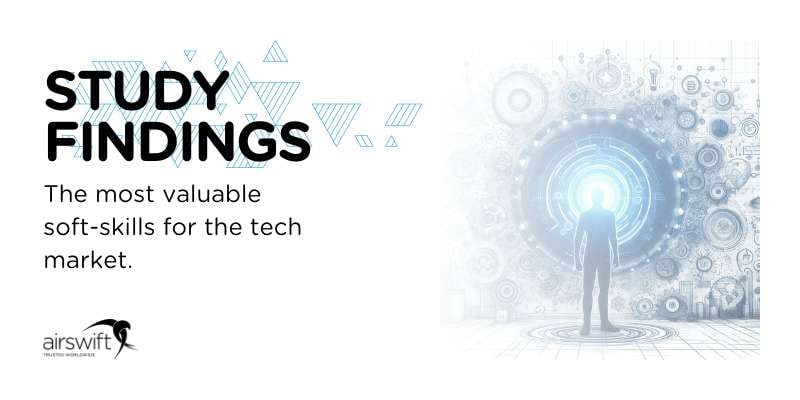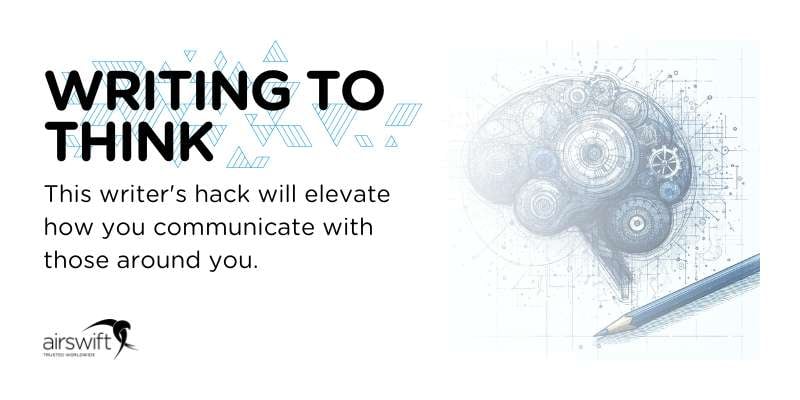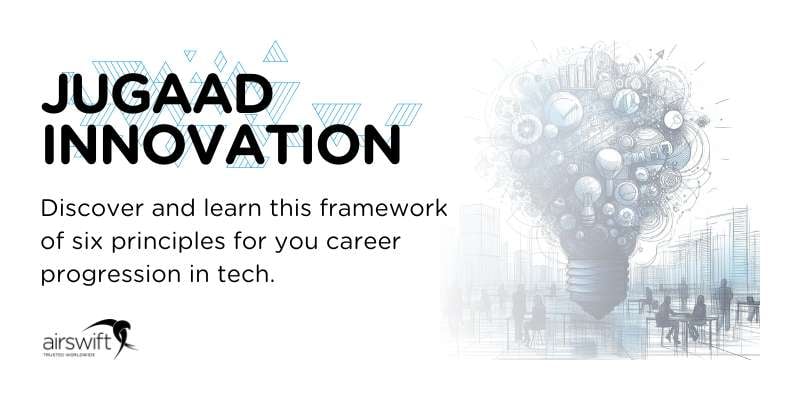
By
Raphael Santos
February 26, 2024
Updated
October 25, 2024
Senior software developers often find themselves at a crossroads where advancing further in their careers entails developing more than just their technical repertoire. While strong coding ability and architectural nous are vital, it is the cultivation of soft skills that truly differentiates a seasoned developer from a transformative leader.
Communication, empathy, and problem-solving skills are not mere buzzwords but critical competencies that enable developers to navigate complex team dynamics and manage projects with finesse.
But what are the most important soft skills for software developers? What are the main soft skills that can help them break into leadership and land an executive role? What skills can truly make a difference?
It's important to analyse the market and studies in this field to understand the skills that set developers apart for career growth.
The core soft skills in-demand by the software market

A study released in 2020 by the Federal University of Minas Gerais, the Concordia University and the Université du Québec à Chicoutimi analysed the description of 20,000 job opportunities in Stack Overflow.
They extracted the soft skills for software developers that popped up in the research, highlighting the importance of the main ones for progressing in the IT job market:
- Communication: Identified as a central skill, with about one in three posts mentioning the need for good communication abilities. This includes verbal and written communication skills, underlining the importance of clear and effective interaction in IT roles.
- Collaboration: Skills related to teamwork and the ability to work well with others are also highly valued, with the word "team" appearing in a significant percentage of job posts. This reflects the collaborative nature of most IT projects and the necessity of being able to work effectively within a team.
- Problem-solving: Companies seek candidates with strong analytical and problem-solving skills, as evidenced by the presence of terms like "analytical," "problem-solving," and "deliver" in job descriptions. This indicates a demand for individuals who can tackle challenges creatively and efficiently.
The findings from this study underscore the multifaceted nature of skill requirements in the IT job market back then, emphasising the need for a balanced combination of technical expertise and soft skills.
So, what about now? How can you incorporate these skills into your everyday life, portfolio, and work? That's what we're about to show you.
Enhance clarity in communication with the art of writing to think

Writing to think is not just about putting words on paper; it's a methodical approach to crystallising our thoughts, championed by thinkers like Julia Cameron and Anne Lamott. By encouraging the practice of reflective writing, we can enhance clarity in communication.
This method, akin to Lamott's "shitty first drafts", promotes an iterative process of refining thoughts and ideas, making complex concepts more accessible and fostering a deeper understanding in both personal introspection and professional discourse.
The basic point for you, my dear developer, is that effective communication requires effort and practice. It's a soft skill, but it’s a fruit of hard work. It can be trained, and it can be mastered.
Start by documenting your thoughts and ideas, letting them mingle, and refining them until you can confidently share a cohesive message with others.
To develop this essential leadership skill, it is important to avoid perfectionism so you can bypass any mental blocks when staring at the computer screen or even a blank page.
This simple act of writing allows your thoughts to flourish and your ideas to blossom, enabling you to express yourself with clarity and capture the attention of others.
Listening skills
Active listening is a critical component of effective communication. Software developers should listen to understand, not simply to respond. They must show engagement by asking relevant questions and providing feedback, which helps in understanding project requirements and addressing issues more efficiently.
Non-verbal communication
Non-verbal cues, such as body language, eye contact, and tone of voice, can vastly impact how messages are received. You should be aware of your own non-verbal signals and sensitive to others' to foster an environment of trust and openness in any tech team.
Expand your perspective with cross-cultural collaboration

Cross-cultural collaboration is a crucible for innovation, offering a blend of perspectives that enrich problem-solving and creativity. Scholars like Geert Hofstede have long emphasised the importance of understanding cultural dimensions to navigate and thrive in diverse teams.
Hofstede was a Dutch social psychologist who worked at IBM as a manager of personnel research from 1965 to 1971. He conducted a large-scale survey of over 100,000 employees from 50 countries and three regions, to measure their values and preferences in the workplace.
His work is widely used in cross-cultural psychology and can teach us a lot about how different cultures influence the behaviour, values, and expectations of people in organisations. Some of the main lessons are:
- Organisational culture is not the same as national culture, but it is influenced by it. Hofstede found that the same organisation (IBM) had different cultural practices in different countries, depending on the dominant values of the local culture.
- Cross-cultural collaboration requires awareness, respect, and adaptation to the cultural differences among the partners. Hofstede’s dimensions of national culture can help us understand and appreciate the diversity of perspectives, preferences, and practices in the world.
- Soft skills are not universal but context-dependent. He argued that what is considered effective communication, leadership, motivation, or negotiation in one culture may not be in another. Therefore, we must develop cultural intelligence and sensitivity to adjust our soft skills to the specific situation.
By embracing these difference and having greater cultural awareness, we foster a global mindset that not only broadens our horizons but also enhances empathy and adaptability, key traits for today’s globalised economy. This collaborative approach underscores the value of diversity as a catalyst for breakthrough ideas and solutions.
Elevate your portfolio impact by problem-solving with limited resources

The concept of “Jugaad”, popularised by professors Navi Radjou, Jaideep Prabhu and Simone Ahuja in their work on frugal innovation, exemplifies problem-solving with limited resources. It's about leveraging creativity and ingenuity to overcome constraints, turning limitations into advantages.
They developed a framework of six principles of Jugaad innovation that you, as a senior developer, can incorporate into your daily routine. For example, you can:
- Seek opportunity in adversity: look for gaps and pain points in the existing software systems and processes and propose innovative solutions that can improve them. Challenge yourself to find new ways to use technology to address social and environmental issues.
- Do more with less: Optimise your code and algorithms to reduce complexity, memory usage, and processing time. Use open-source tools and platforms to leverage existing solutions and communities. Reuse and repurpose existing code and components to create new functionalities and features.
- Think and act flexibly: Be open to feedback and suggestions from your customers and colleagues and incorporate them into your work. Use agile and lean methods to deliver working prototypes and test them with real users. Learn from your mistakes and improve your solutions based on data and evidence.
- Keep it simple: Focus on the user needs and the value proposition of your solution and avoid adding unnecessary bells and whistles. Use simple and intuitive design and user interface to enhance the user experience and satisfaction. Simplify your documentation and communication to make your work easy to understand and use.
- Include the margin: Explore new markets and segments that are underserved or overlooked by the mainstream software industry and create solutions that cater to their specific needs and contexts. Involve the end users and other stakeholders in the co-creation and co-design of your solution and enable them to customize and adapt it to their preferences and situations.
- Follow your heart: Find projects and tasks that align with your personal interests and passions and that make a positive impact on the world. Express your creativity and originality in your work and share it with others. Seek meaning and purpose in your work and celebrate your achievements and contributions.
By adopting this mindset, developers can showcase their ability to innovate under pressure in their portfolios, demonstrating not just technical skills but a proactive approach to challenges.
This philosophy encourages thinking outside the box, showcasing a portfolio that reflects resilience, adaptability, and inventive problem-solving capabilities, and these are the soft skills for software developers who want to lead.
And last but not least: Personal branding and networking
![]()
Personal branding and networking have emerged as pivotal elements for career development, especially in the tech industry. Personal branding allows individuals to differentiate themselves by showcasing unique skills, experiences, and values, effectively communicating their professional identity to the world.
Networking, on the other hand, opens doors to new opportunities, insights, and collaborations by connecting with peers, mentors, and industry leaders.
Together, these strategies empower professionals to build a reputation, gain visibility in their field, and access resources that can propel their careers forward.
Emphasising these aspects can significantly enhance your professional trajectory, making them indispensable tools in the modern job market.
- Define your brand: Identify your unique skills, passions, and what differentiates you from others. This could involve your technical expertise, problem-solving approach, or personal projects that showcase your abilities.
- Create content: Share your knowledge and insights through blogs, social media, or public speaking at tech meetups and conferences. This not only showcases your expertise but also contributes to the community.
- Engage on social platforms: Use LinkedIn, Twitter, and other professional networks to connect with industry leaders, join relevant groups, and participate in discussions. Regular engagement increases your visibility and credibility.
- Network purposefully: Attend industry events, workshops, and webinars to meet professionals with similar interests. Building genuine relationships can open up opportunities for collaboration and mentorship.
- Showcase your work: Use platforms like GitHub for your projects or a personal website to serve as a portfolio. This makes it easy for potential employers or collaborators to see your work.
- Seek feedback: Regularly ask for feedback from peers and mentors to refine your brand and approach. Continuous learning and adaptation are key to staying relevant in the tech industry.
Implementing these strategies requires consistency and authenticity, ensuring your personal brand and network grow in a way that aligns with your career goals and values.
Take the next step in your career with Airswift
Now that we’ve delved into the cultivation of soft skills for software developers that can elevate you into a leadership role, we're excited to present an enticing opportunity for a new adventure in the tech world.
At Airswift, we are a global business with a sprawling network across 60+ offices worldwide, 9,000+ contractors, and 1,000+ dedicated employees, we excel in connecting brilliant tech minds with top-tier companies around the world.
Whether you're in the market for a permanent role, a flexible contract, or the freedom of remote work, we've got you covered.
Sign up with our candidate portal to discover thousands of job openings within the technology and engineering sectors.

